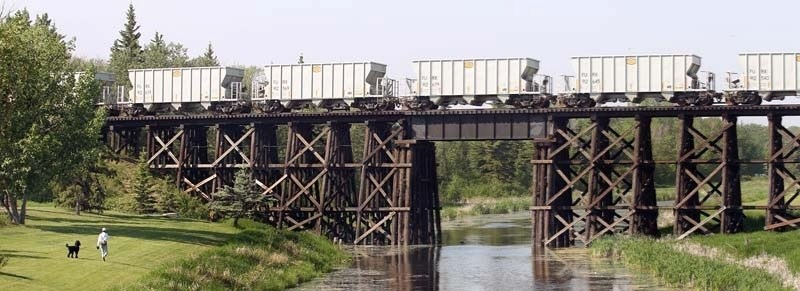St. Albert residents can rest a little easier knowing city council has approved a train-whistle cessation bylaw – although uninterrupted sleeps could still be years away.
Following a Sept. 19 public hearing, council passed a new bylaw that would restrict the routine use of train whistles at several road crossings within city limits.
But regardless of the bylaw, CN will not stop the routine use of whistles until the city makes upgrades mandated by the federal government as part of the Grade Crossing Standards document, updated in 2014. Those changes must be made by 2021, regardless of whistle cessation. The necessary changes, including fencing and signage, will cost more than $1.1 million.
The decision came after council reviewed a survey of residents in which nearly one-third of respondents – 255 people out of 836 – said train whistles were affecting their quality of life.
The online survey, hosted on the city’s website from Aug. 8 to Sept. 11, found residents in neighbourhood near the western track through town, known as the Sangudo Line, were most likely to be concerned about train whistles.
Grandin resident Tracy Engel, the only resident to speak as part of the public hearing, explained she has lived in that neighbourhood for close to three decades and at first had hoped she would get used to the whistles, but still hasn’t.
And even her children, who have lived with the whistles all their lives, are still affected.
“I can tell you that my daughters, now both in their 20s, assure me they too hear the whistles,” she said. “There are some times the train whistles blow so many times, there are no ear plugs that can end the noise.”
Coun. Wes Brodhead, who has long championed whistle cessation in St. Albert, encouraged council to support the bylaw, noting despite the majority of respondents saying it wasn’t a concern, the impact is severe on those affected.
“The results coming out of the public survey weren’t all that surprising to me, because unless you’re really bothered by whistles in the middle of the night, then that’s not an issue to you,” he said. “You don’t have to do a whole lot of research in this particular regard before you run up to scholarly articles that say basically a broken night’s sleep is as bad as getting no sleep.”
“There are some clear indicators of locations that may be priority for fencing, again with targeted areas to support whistle cessation,” transportation manager Dean Schick told council.
The total cost of all the improvement is estimated at roughly $1.1 million, although there is $720,278 already budgeted in three separate funds to improve rail-crossing safety. Council also approved a motion to consolidate those funds into a single account.
Schick suggested the remaining $394,000 needed to do the necessary work will likely be available through federal grants. Likely, he said, but not guaranteed.
The work, however, may be several years away. Grant funding applications for 2017 construction closed Aug. 1, 2016, so any grant money coming would be for the 2018 construction season.
Brodhead said there are roughly 15-20 whistles that blow each night as a result of the railway’s standard rule of blowing four times for each crossing – two long, one short, and another long – and that is what this bylaw would stop. In the event of any emergency, the train operators would still be permitted to blow the whistles.
“If there’s a problem along the line, they’re going to blow the whistle,” he said.
Councillors unanimously supported the changes.




